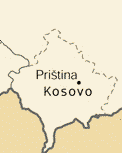|
|
|
 |
 |
|
 |
|
THE
LEGAL AND POLITICAL CONSEQUENCES OF KOSOVO INDEPENDENCE
(part 1) |
 |
|
1. INTRODUCTION
Last month I appeared as a witness at the
International Criminal Tribunal for the Former
Yugoslavia. During the questioning by the defendant,
former President Slobodan Milosevic, he asked me to
quote excerpts from an article I had written in 2000
entitled, New Diplomacy, Old Agenda. One of the excerpts
read as follows: |
|
 |
 |
 |
"The U.S. led attack
on Yugoslavia was designed to improve President Clinton's public
image and restore credibility to NATO, whose existence since the
end of the cold war was in jeopardy. This was the real agenda of
the NATO war. In terms of Balkan history it is an old agenda.
Traditionally western intervention in
the Balkans has proven to be disastrous. From the Congress of
Berlin to both world wars, the western powers have intervened in
the Balkans for their own selfish policy objectives. These aims
have had little relevance to the issues
affecting the peoples of the Balkan countries. What was
true of the past has proven true again
in Kosovo." |
 |
 |
 |
|
The events that have taken
place in Kosovo since I wrote that article have only served to
reinforce the truth of what was then written. Western policy
since the end of the illegal bombing of Yugoslavia has been a
total failure. The massive ethnic cleansing of the non-Albanian
population, the reign of terror against those few Serbs who have
remained, the rampant burning and blasting of Christian
churches, the refusal to disarm the Kosovo Liberation Army, the
acceptance of widespread drug and human trafficking in the
so-called UN protectorate stand as evidence against the NATO and
United Nations authorities. These are hard facts. They stand as
testimony to failure. |
 |
 |
 |
| Unfortunately, the
Serbian tragedy is not yet over. Sometime this year a decision
will be announced about Kosovo independence. I say announced
because there is some evidence suggesting the decision has
already been made to tear away that integral part of Serbia and
to grant Kosovo independent status. The Economist magazine of
18- 24 February 2006 reported that John Sawers the political
director of the British Foreign Office told a group of Serbs in
Kosovo earlier in the month that the Contact Group had already
decided on independence for Kosovo. Since the talks between
Serbia and representatives of the Kosovo Albanians are being
undertaken under the auspices of the Contact Group Mr. Sawers
words are not to be taken lightly |
 |
 |
 |
| There are other
indications that independence is already a foregone conclusion.
The Contact Group Guiding Principles announced in November 2005
stated, among other things, that there could be no return of
Kosovo to the pre-1999 situation. This is an ambiguous statement
but since prior to 1999 Kosovo was an integral part of Serbia
this guiding principle could be interpreted to mean that Kosovo
will no longer remain part of Serbia. Other remarks by senior
United States officials have made it clear that the option of
independence for Kosovo is open for discussion. These are
ominous signals that the guarantees set out in UN Resolution
1244 reaffirming the sovereignty and territorial integrity of
Yugoslavia as set out in the Helsinki Final Act may be ignored
or conveniently overlooked as have other parts of the
resolution. |
 |
 |
 |
| The influential International
Crisis Group has not been hesitant in setting out its views on
the issue of independence. It has made its recommendations
abundantly clear in a report dated February 17, 2006 entitled
Kosovo: The Challenge of Transition. That report recommends
that, "The international community and in particular the UN
Special Envoy charged with resolving the status process, Martii
Ahtisaari, must accordingly prepare for the possibility of
imposing an independence package for Kosovo, however
diplomatically painful that may be in the short term"
There is
no concern expressed by the Contact Group or UN officials that
because Martii Ahtisaari is a prominent member of the ICG that
this report would appear to place him in a conflict of interest
position. There is further reason to suspect his impartiality as
a mediator since Der Spiegel magazine has reported that Mr.
Ahtisaari has said that Kosovo is headed for independence. |
 |
 |
 |
| There may least be some
comfort that the ICG seems to have dropped the idea it
once advocated that the discussions include the
possibility of adjusting Kosovo's northern border to
include the Presevo valley. However, if the ICG has
dropped the idea of incorporating part of southern
Serbia into a new and independent state of Kosovo the
Albanians in southern Serbia have not. Three ethnic
Albanian municipalities in southern Serbia have passed
resolutions calling for political and territorial
autonomy and the withdrawal of Serbian security forces
from the area. |
 |
|
 |
 |
 |
| The demands of the Albanians in
southern Serbia underline the dangers inherent in the violation
of the territorial integrity of states even if it is carried out
under the aegis of supposedly responsible international agencies
like the Contact Group and is sanctioned by the European Union.
Should a decision be taken to grant independence to Kosovo a
precedent will have been established that will pose a serious
threat to the very structure of world peace and security. The
stakes here are high and any decision on Kosovo independence
will have implications that go far beyond the geographical
confines of the Balkans |
 |
 |
 |
|
2.
TERRITORIAL INTEGRITY
The territorial integrity of states is an old
principle that is generally acknowledged to have been firmly
established by the Peace of Westphalia in 1648 which
declared that outside interference in a state's internal
affair was illegitimate. Through the years the principle of
territorial integrity has not diminished. It is still
considered one of the most basic principles of international
law and continues to be a major instrument for the
prevention of armed conflict between states. |
 |
 |
 |
| Article 2[4] of
the United Nations Charter includes territorial integrity as one
of the principles that prohibits the threat or use of force in
the resolution of international disputes. Territorial integrity
is included in the Declaration of Principles of International
Law concerning friendly relations among states. The United
Nations Charter regards it as one of the paramount elements
included in the concept of sovereign equality. |
 |
 |
 |
| The Helsinki Final Act of 1975
reinforced the principle of territorial integrity and went
further by including a section on the inviolability of
frontiers. It is hoped that members of the Contact Group and the
UN Special Envoy are familiar with the wording of these two
sections of the Act. They read as follows: |
 |
 |
 |
SECTION III: INVIOABILITY OF
FRONTIERS
The participating states regard as inviolable all one another's
frontiers as well as the frontiers of all States in
Europe and therefore will refrain now
and in future from assaulting these
frontiers.
Accordingly, they will also refrain from any demand for, or act
of, seizure and usurpation of
part or all of the territory of any
participating State.
SECTION IV: TERRITORIAL INTEGRITY OF STATES
The participating States will respect the territorial integrity
of each of the
participating States.
Accordingly, they will refrain from any action inconsistent with
the purposes and principles of
the Charter of the United Nations
against the territorial integrity,
political independence or the unity of
any participating State, and in particular from
any such action constituting a threat or use of force.
The participating States will likewise refrain from making each
other's territory the object of
military occupation or other direct or indirect measures of
force in contravention of
international law, or the object
of acquisition by means of such measures
or the threat of them. No such occupation or acquisition will be
regarded as legal. |
 |
 |
 |
|

|
These are fundamental
principles. They form an integral part of the framework
of international law. They are designed to be a
guarantee of international security and mutual respect
among nations. They are to have universal application
and cannot be put aside because of special circumstances
or when they prove embarrassing or
inconvenient.
Their message is simple and clear. Borders can only be
changed by agreement between states.
(
next page ) |
|
 |
|
|

